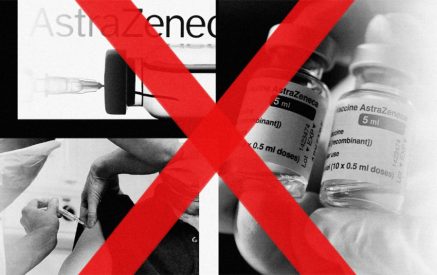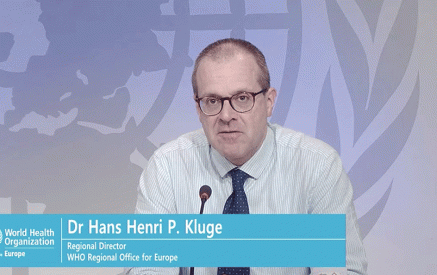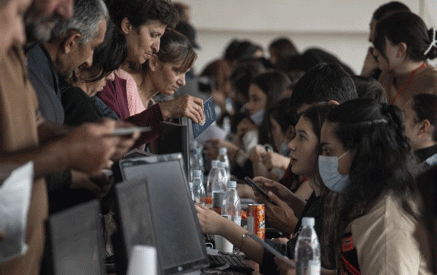Pan-European Commission on Health & Sustainable Development makes recommendations for 53 countries in the WHO European Region
Adopt a ‘One Health’ policy recognizing interconnectedness of human, animal & environmental health.
Address deep-seated health, social, economic and gender inequalities exposed by the pandemic.
Read also
Invest in innovation, data collection and sharing, and strong national health systems.
Improve regional and global health governance, learning lessons from COVID-19.
COPENHAGEN & MOSCOW, September 10 – Despite repeated warnings of a global pandemic from the scientific community, the world was not prepared when SARS-CoV-2 first emerged in late 2019.
Divergent and erroneous policy responses meant the impacts of COVID-19 have been and continue to be catastrophic, with over 1.2m deaths in the European region alone (over 4m globally) and an unprecedented economic downturn that dwarfs the 2008 global financial crisis. It is vital we learn from our mistakes for we cannot afford to make them again.
Dr Hans Henri P. Kluge, Regional Director for WHO Europe, said:
“We can’t allow another pandemic to bring the world to its knees and must do everything in our power to prevent a catastrophe on the same scale from happening again. That’s why I have convened the Pan-European Commission on Health & Sustainable Development, led by former Italian prime minister, Professor Mario Monti, and made up of subject-matter experts from across the European region, to reflect on what has and more often hasn’t worked in our response to COVID-19.
“We are calling for action at all levels of society – on fixing fractured societies; on safeguarding planetary health; on innovation and investment in health systems; and on better European and global governance. Our main challenge has not been identifying strategies for success – we know what we need to do – but our collective inability to implement them effectively. A significant obstacle has been reluctance on the part of governments to share decision-making powers or to agree shared governance arrangements for the benefit of all. It’s time to learn some important lessons so we don’t make the same mistakes again.”
Professor Mario Monti, Chair of the Pan-European Commission on Health & Sustainable Development, said:
“The Pan-European Commission on Health & Sustainable Development calls on national governments, regional and global organizations, and stakeholders of health and social care systems, to engage in far-reaching reforms, investment programmes and improvements in governance, drawing light from the pandemic.
“In addition to increasing prevention, preparedness and response to pandemics, our recommendations design a new strategy for health and sustainable development. This requires awareness of the interconnections between human, animal and plant health and their impact on emerging zoonotic diseases; of the links between climate change, biodiversity and human health; and of the need to reinvigorate and extend our national health services.
“Last, but not least, it is necessary to enhance the position of health policy in overall policy making by governments and international organizations, by setting up a Global Health and Finance Board at the G20, recognizing that health is a global public good. New generations deserve a better world; one where progress does not come at the expense of their health and the health of the planet.”
Many countries’ first ‘knee-jerk’ reaction to the pandemic was to close geographic and economic borders, implement isolated national responses and ignore cross-country considerations. However, COVID-19 showed us that single country solutions are not enough when it comes to the spread of communicable diseases in a hyper-connected globalized world. Such crises can only be tackled effectively through joint international action.
ONE HEALTH
The concept of ‘One Health’ recognizes the interconnection between people, animals, plants and their shared environment. When one part of One Health is at risk, the other pieces are also in danger. Human activities like deforestation, the trade and consumption of wildlife, and international travel, are thought to have led to the emergence of SARS-CoV-2 and facilitated its global spread. We, and our descendants, now face a precarious future unless we all take urgent action to correct course.
The Commission recommends countries establish cross-government One Health strategies, based on the concept of ‘health in all policies’ to safeguard future generations from existential threats.
INEQUALITY
For years, policies have contributed to high levels of wealth and income inequality, underinvestment in social protection, unequal opportunities, job insecurity, precarious housing, racism and other forms of discrimination. We must close the equality gaps now, to mend the declining levels of trust in public bodies and decrease polarization in society.
The Commission recommends countries identify and target those who lead precarious or impoverished lives and tackle societal distrust to improve social cohesion, including setting quotas for female representation on public bodies tasked with drafting and implementing health policies.
The Commission recommends countries gather data on the various levels of health within populations and develop monitoring of health inequality and access to health and social care.
INNOVATION
The pandemic has clearly demonstrated that the existing model of innovation in health – where most of the risk is borne by the public sector and most of the returns flow to private companies – is flawed and not fit-for-purpose. The scale of the pandemic meant a huge amount of resources were available for vaccine development and R&D, which is not the case for products where there is only a small market, for example medicines to treat rare diseases.
The Commission recommends that governments harness innovation to improve One Health, based on partnership between the public and private sectors, where both risks and returns are shared.
INVESTMENT
The pandemic delivered an unprecedented shock to national health systems. There were shortages of almost everything: beds, health workers, protective equipment, even oxygen. At the same time, outside our hospitals, frail and elderly people in long-term care facilities were not sufficiently protected, causing many avoidable deaths. In many countries, routine activities like primary care and mental health services effectively ceased. Suspension of some activities, like cancer screening, is likely to have a profound impact in the years to come.
The Commission calls on countries to address long-standing funding gaps in primary healthcare, mental health and social care, while investing in and protecting the health workforce.
The Commission calls on governments to proactively prioritize the prevention of communicable and non-communicable diseases, rather than reacting to healthcare issues as they arise.
SURVEILLANCE & MONITORING
Pandemic prevention and management cannot be left to private markets nor to individual countries. The country or countries unable to contain the virus become a source of new infection and variants. Surveillance and data collection therefore become essential to controlling the pandemic, and requires a global effort built on trust and information-sharing. Capturing health data expenditure can also inform evidence-based decision-making and encourage innovation.
The Commission calls on countries to invest in measures to reduce health threats, provide early warning systems, and strengthen surveillance and data collection while safeguarding individual privacy.
GLOBAL GOVERNANCE
COVID-19 demonstrated how some governance structures failed to protect our societies from the worst impacts of the pandemic, with some countries resorting to responses informed by politics rather than science. There is at present no global taxation system, nor is there any way to sanction countries that don’t contribute towards global public health. To safeguard future generations and be ready for the next pandemic, we must improve global health governance.
The Commission calls for the establishment of a Global Health Board under the auspices of the G20, the development of a Global Pandemic Treaty and a Global Pandemic Vaccine Policy.
REGIONAL GOVERNANCE
The WHO European region stretches from the Western edge of the continent in the Atlantic Ocean (Greenland) to the far east of Russia and the Pacific Ocean. It is an extremely diverse region, with variations in wealth, population size, demographics, access to healthcare, levels of education and (digital) interconnectedness. This poses a series of coordination and policy problems.
The Commission calls for the establishment of a Pan-European Network for Disease Control and a Pan-European Health Threats Council, while investing in data-sharing and data-interoperability platforms across the region.
WHAT NEXT?
There is real work to be done to ensure the hard lessons learned in the European region over the past 20 months are translated into action. Concerted commitments by governments to change and to change together are essential if the region and the world are to become truly resilient and address the inequalities and failures that perpetuate the experience of crisis.
ENDS
NOTES TO EDITORS
The Pan-European Commission on Health and Sustainable Development is an independent and interdisciplinary group of leaders, convened by the WHO Regional Office for Europe on the initiative of its Regional Director Hans Kluge, to rethink policy priorities in the light of pandemics. Comprising former heads of state and government, distinguished life scientists and economists, heads of health- and social-care institutions, and leaders of the business community and financial institutions from across the WHO European Region, the Commission brings together individuals with outstanding expertise and experience.
To receive an embargoed copy of the report, please email us.



























































